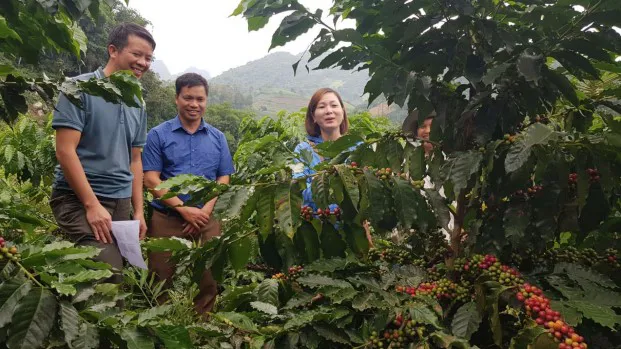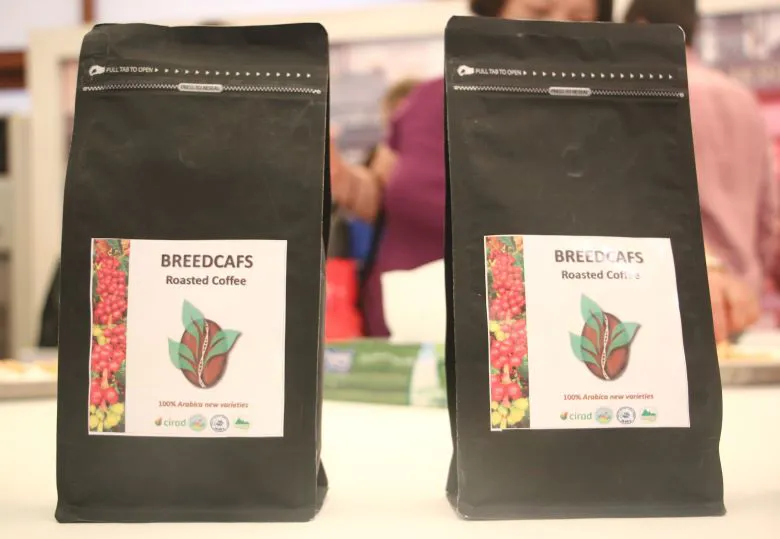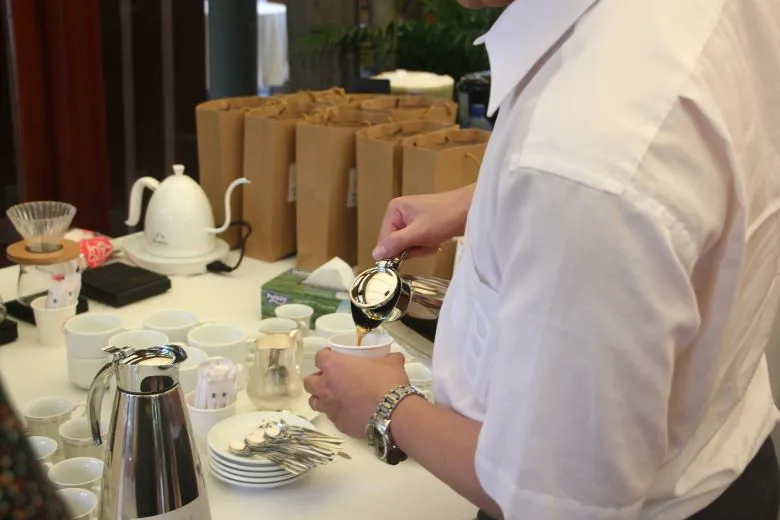France helps boost coffee yields in Vietnam
Senior experts said the new hybrids bring vitality to Vietnam’s coffee industry, which is known being a Robusta grower, not Arabica.
Vietnam is known for being the world’s second-largest coffee producer but its coffee farming in decades should be changed by diversifying varieties to boost productivity and quality, experts have said.
| Coffee plantation in the France-supported project. Photo: CIRAD |
In this regard, French, European, and Vietnamese scientists have been testing new Arabica coffee varieties (F1 hybrids) in the mountainous areas of the northern provinces of Son La and Dien Bien, home to Arabica coffee, to choose the best kinds that are of both high yield and good taste for large-scale plantation in the future.
“Coffee growing in Vietnam dates back thirty years or so. Current varieties are no longer adapted to climate change in the coming years,” said Pierre Marraccini, a researcher at the French Agricultural Research Center for International Development (CIRAD).
In December 2019, more than 3,000 hectares of coffee were damaged by extreme cold waves in Son La Province. By 2025, half of the 20,000ha of coffee in Northwestern Vietnam will need to be replanted.
For that reason, since 2017, CIRAD, ECOM Agroindustrial Corp., and some Vietnamese research institutes have been testing F1 hybrids, which were selected and popularized in Central America, for coffee cultivation in the Vietnamese soils.
The introduction and testing of these new varieties (Starmaya, Marsellesa, Centroamericano H1, Mundo Maya H16) were first funded by the European Union (EU) through the BREEDCAFS project between 2017 and 2022, and then by the EU and the French Development Agency (AFD) through the ASSET project for 2021-2024.
“These varieties are particularly suitable for agroforestry because they maintain good yields in shade conditions,” said Pierre Marraccini.
The yields, about 15% higher than the local variety, combined with better taste quality will ensure a more dignified income for producers.
| French Ambassador to Vietnam Nicolas Warnery speaks at the meeting in Hanoi on June 6 to review the project. Photo: Dieu Linh |
Make changes in coffee farming
Prof. Do Nang Vinh, Vice Director of the Agricultural Genetics Institute (AGI), said it’s significant that the coffee varieties and biotech used in Vietnam are transferred from CIRAD. The excellent varieties are the results of long-term joint research by CIRAD and Central American institutes, labs, and companies.
The hybrid varieties are much better than Catimor, the kind which has been available in Vietnam’s northern region, in terms of yields, quality, and resistance to environmental conditions, Prof. Do told The Hanoi Times.
In addition, the new varieties are adapted to agroforestry intercropping systems, in which annual or perennial crops are grown between tree rows. The sustainable agricultural method promoted by CIRAD involves intercropping in upland fields, contributing to soil fertility, biodiversity maintenance, and climate regulation.
“I think this is the coffee variety revolution. Vietnamese people will enjoy a better quality and more productive coffee,” said Prof. Vinh, who is Vietnam’s representative on the Board of Governors of the International Center for Genetic Engineering and Biotechnology (ICGEB), an intergovernmental organization under the United Nations Industrial Development Organization.
Sharing the same ideas with Prof. Vinh, Director of the Northern Mountainous Agriculture & Forestry Science Institute (NOMAFSI) Luu Ngoc Quyen, said the France-supported project brings about new varieties of high yields and resistance to typical diseases namely coffee rust and coffee brown-eye spot.
Dr. Quyen said that all four new varieties are better in the coffee cupping score, earning between 76 to 82 points. The coffee cupping score developed by the Specialty Coffee Association goes from 0 to 100, and only coffees scoring 80 points or above get the “specialty coffee” badge of honor. Commercial-grade coffee scores anywhere from 60 to 80.
Notably, the new varieties show optimal ripeness point that is essential for quality and yield, avoiding post-harvest losses, Dr. Quyen shared with The Hanoi Times. He said the new kinds would likely replace Catimor in the future.
| Roasted coffee - finished product of the project launched in 2017. Photo: Dieu Linh |
Significant results
Through results earned in the project launched in 2017, the new varieties, which are grown in a trial area of three hectares, are proved to be adaptable to the local climate, suitable for agroforestry, and of good quality, according to Clément Rigal, a CIRAD expert.
Under current conditions, these new varieties are very suitable for Vietnam’s Northwest, especially the highlands, Rigal said at a meeting in Hanoi on June 6 to introduce the five-year results in the presence of French Ambassador to Vietnam Nicolas Warnery and an audience of foreign and Vietnamese authorities and partners.
Ambassador Warnery said this project is part of the decades-long agriculture cooperation between France and Vietnam, demonstrating the tireless efforts dedicated by scientists of both countries in the agriculture industry in which coffee is the main crop.
The trial in northern Vietnam proved to be a great success. Over the project’s five years, the researchers took delivery of young plants and distributed them to the Vietnamese partners then monitored the growth. The cherries are of better quality and give larger beans. Meanwhile, the high cup quality is good news for the local coffee industry.
For the project in Vietnam, CIRAD advocates growing coffee in agroforestry systems as the method protects soils and biodiversity and makes local farmers more resilient by diversifying their operations.
These hybrids are particularly suited to agroforestry because they can maintain their high production capacity despite being grown under the cover of agroforest species.
As a result, the Vietnamese authorities are very enthusiastic about the success story. The accreditation of these hybrids began recently in the country with Son La and Dien Bien would be the hubs to replant 500ha and 300ha, respectively, of hybrids.
According to Dr. Luu, Dien Bien and Son La are home to 20,000ha of Arabica, one of the coffee hubs in Vietnam.
Dao The Anh, Deputy Director of the Vietnam Academy of Agricultural Sciences (VAAS) said “This is a very good opportunity for us to replace old coffee varieties with new hybrid ones developed by CIRAD.” They can be grown in the Northeast or in the main coffee-growing regions in Vietnam such as Quang Tri or Lam Dong.
He highlighted the role of public-private partnership (PPP) in the supply chain, saying that the project is promising in terms of commercial values.
In this regard, ECOM Agroindustrial Corp., one of the world’s top two merchants in coffee and one of the partners in the project, pledged to join the supply chain to ensure the output for local farmers. Apart from the foreign firm, domestic companies, including Detech Coffee, a local company, participate in the system called “from farm to cup.”
| Coffee is now available for tasting. Photo: Dieu Linh |















